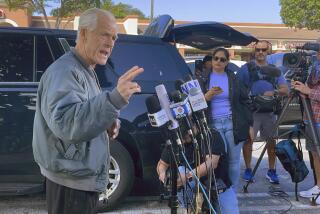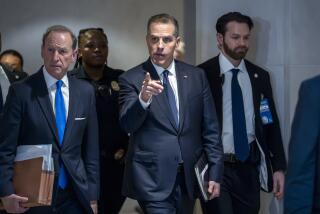White House aide declined to cooperate in Fast and Furious probe
WASHINGTON — The Justice Department’s inspector general testified on Capitol Hill on Thursday that a top national security official refused to cooperate with his investigation into the failed Fast and Furious gun-tracking operation and whether there were any links to the White House.
Michael E. Horowitz, whose 471-page report released Wednesday outlined a series of systemic problems at the Justice Department and the Bureau of Alcohol, Tobacco, Firearms and Explosives, told a House oversight committee that then-White House national security assistant Kevin O’Reilly had refused to voluntarily submit to an interview.
O’Reilly was of interest to the investigation, Horowitz said, because of a series of emails between him and William D. Newell, the top ATF supervisor in the Phoenix field office, which ran Fast and Furious. ATF agents allowed illegal gun purchases in hopes of snaring a Mexican drug cartel leader on the Southwest border.
In some of the emails, Newell updated O’Reilly on Fast and Furious, and the White House aide told him the information was useful in the administration’s efforts to curb gun-smuggling.
But Horowitz told the House Committee on Oversight and Government Reform that O’Reilly would not cooperate with his investigation.
“We reached out to his lawyer regarding an interview, and his lawyer told us he would not appear voluntarily,” Horowitz said. Because O’Reilly did not work for the Justice Department, Horowitz could not compel him to talk about his relationship with Newell and whether the White House had any role in Fast and Furious.
“O’Reilly’s unwillingness to speak to us made it impossible for us to pursue that angle of the case,” Horowitz said.
O’Reilly is a career State Department employee detailed to national security. Newell testified last year that the two of them had a long personal relationship and that he was only passing on information to his friend. Committee investigators also were unable to interview O’Reilly because he had been transferred to Iraq.
O’Reilly’s attorney, Thomas G. Connolly, declined to comment Thursday except to emphasize that the emails from Newell never revealed the questionable gun-walking tactics used in Fast and Furious, a fact borne out by the inspector general’s report.
At the White House, an official also said that the Newell-O’Reilly relationship was only personal, and that the White House was not involved in Fast and Furious.
Separately, the White House told the inspector general’s office that the only documents they had regarding Fast and Furious were the O’Reilly-Newell emails, which they provided to the House committee. The White House did not give the inspector general any other documents, Horowitz’s report said, because “the White House is beyond the purview of the inspector general’s office.”
Horowitz’s testimony came as Democrats and Republicans gave conflicting interpretations of his report during the hearing.
Democrats said the report vindicated the top leadership at the Justice Department in the flawed gun-tracking program, while Republicans said it showed that Atty. Gen. Eric H. Holder Jr.’s “inner circle” did not adequately serve him.
The inspector general’s report concluded that ATF agents and federal prosecutors in Phoenix and top ATF and Justice Department officials in Washington were to blame for losing about 2,000 firearms on the U.S.-Mexico border after agents allowed illegal gun purchases in hopes of tracking them to Mexican cartel leaders.
Horowitz emphasized in his report that Holder was never told about the tactics used in Fast and Furious, and noted that once Holder learned of the operation he quickly closed it down and called for the inspector general investigation.
In his committee testimony Thursday, Horowitz said some Justice Department officials never even read the wiretap applications in Fast and Furious before signing and approving them.
“This was such a significant event that was being authorized that it deserved attention,” he said.
More to Read
Start your day right
Sign up for Essential California for news, features and recommendations from the L.A. Times and beyond in your inbox six days a week.
You may occasionally receive promotional content from the Los Angeles Times.






